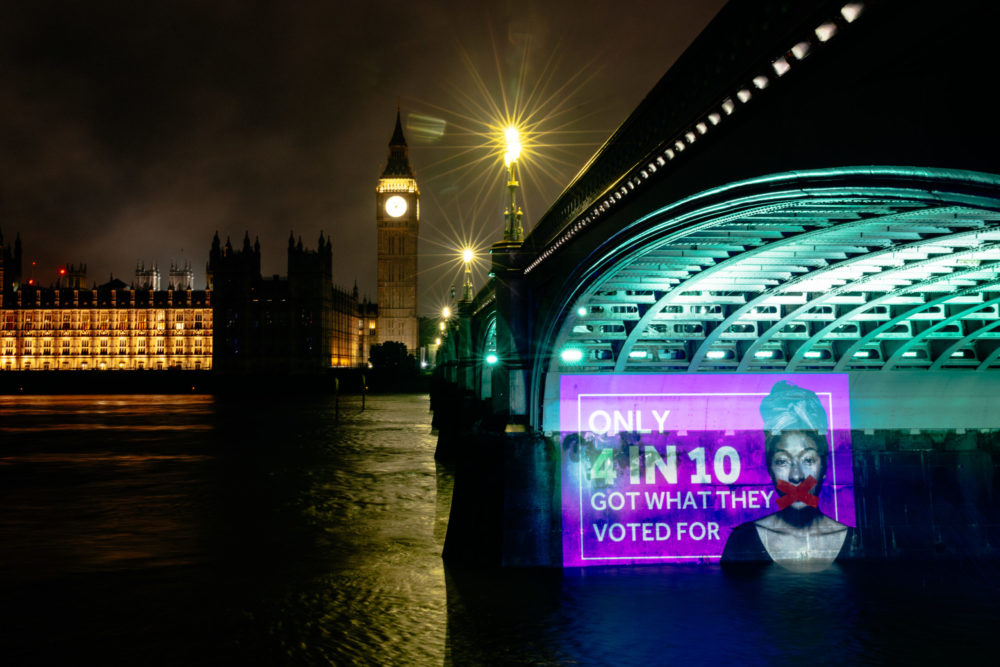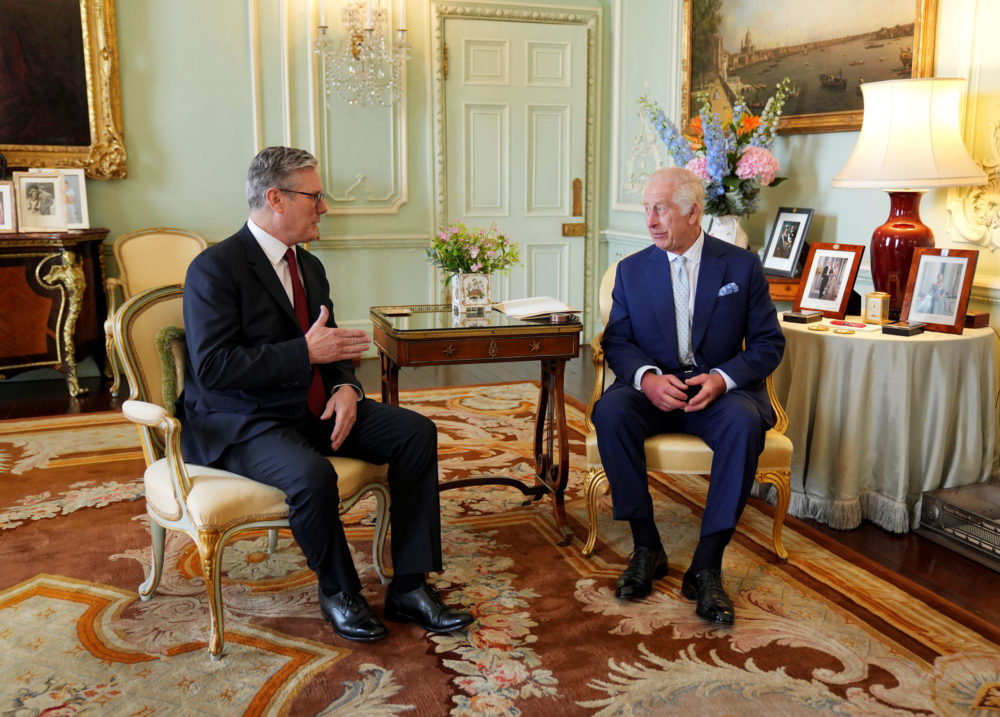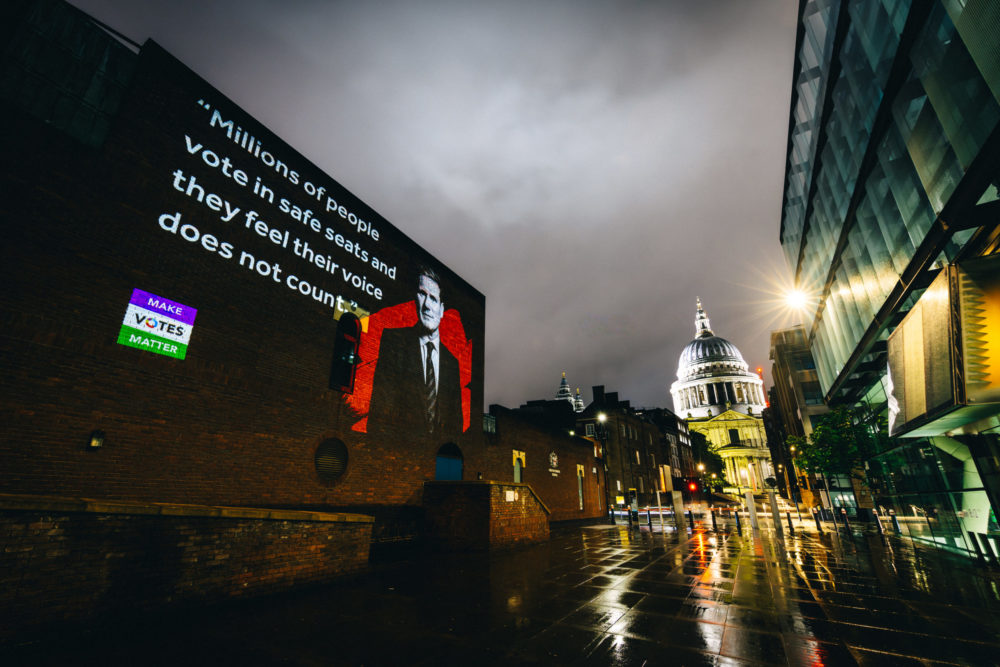The time for Proportional Representation has come

Alberto Smith Interim Chief Strategy Officer, Make Votes MatterAs with every election, on Thursday millions of us went to the polls to have our say on which people with which policies will represent us in Parliament for the next four-to-five years.
Yet in many other ways, this election was different, not least in how much the results conceal the reality of our votes.
This was the most disproportional UK general election in history, with nearly 6 in 10 voters not getting an MP they voted for, comfortably the highest number ever for a UK general election.
From next week, we will have a Parliament more out of step with the views and preferences of the electorate than ever before.
All-time low
More voters than ever turned their back on the two main parties whose duopoly underpins First Past the Post.
The share of the vote going to Labour or the Conservatives was a combined 57.6%, an all-time low, and the latest rung – 2017 and 2019 aside – in what has been a pronounced downward trend.
The public are increasingly resisting the idea that they can be divided into two narrow camps, so why doesn’t our politics reflect that?
Sleight of hand
Nothing is more emblematic of this mismatch than Labour’s change in fortunes.
In 2019, Labour were widely felt to have had one of their ‘worst ever performances’, securing only 203 seats.

Whereas in 2024, many have described Labour’s 412 seats as among their ‘best ever’ results. This, despite receiving 500,000 votes less in 2024 than in 2019.
In Wales, the same dynamic was in evidence: Labour won 84% of seats in Wales on only 37% of the vote, a 4-point drop in vote share from 2019.
Distortion
The point is this: under First Past the Post, some people’s votes have more impact than others’.
When measured using the Gallagher Index, (which assesses how well the make-up of Parliament reflects the way the country voted, with a number close to 0 indicating a more proportional result) this election scored 24.
Even by the standards of our deliberately distortive system, this is unprecedented.
Indeed, the only election in any advanced democracy ever to top this level of disproportionality was the French legislative election in 1993.
A Parliament this out of step with the views of those it serves, even in isolation, represents an egregious example of system failure.
But it comes at a time, according to the National Centre for Social Research, when 45% of people say they ‘almost never’ trust the government – to borrow a phrase – to ‘put country before party’.
The new UK government assumes unbridled power with the support of merely 1 in 3 voters – a risible claim to a clear mandate which only gets thinner when you consider 4 in 10 registered voters chose not to vote, and a further 7-9 million (estimates vary) eligible voters were not even registered.
With the vast majority of people’s views unrepresented in government, First Past the Post risks exacerbating the crisis of trust in politics by manufacturing a consensus behind the new direction of travel where none exists.
Crisis of confidence
To avoid this trap, what has been dubbed as the ‘change election’ must deliver lasting change to the way politics is done, not simply passing change in the personnel at the top.
Without giving the public the ability to positively engage in politics as equals, wherever we live and whomever we vote for, we risk trust in politics remaining at record-lows, undermining further aspects of our democracy and creating a crisis of confidence in more of our institutions.

Elections should fuel a cycle of trust in politics through facilitating real agency, debate and engagement, not become a source of frustration in and of themselves.
Labour campaigned on a principled drive for the restoration of stability and trust in politics.
As the beneficiaries on this occasion of the volatility and disproportionality driven by the voting system, it’s now time for Labour to make good on that promise and take action to address rock-bottom trust in our politics.
The public demand for change is clear: 54% of people back a change to the voting system.
The Labour Party membership and unions have also repeatedly signalled their support for Proportional Representation (PR), and there is a strong cross-party consensus on the need for change.
This election result pulls back the curtain on the damage our broken voting system is doing to representation and engagement in politics.
It’s time to reset our political system by ensuring that at the next election everyone has an equal voice, vote and stake in our politics. PR’s time has come.
Find out more about Make Votes Matter.
Support our Nation today
For the price of a cup of coffee a month you can help us create an independent, not-for-profit, national news service for the people of Wales, by the people of Wales.







PR is long overdue.
It is if you want wrangling for weeks before a government is formed,nobody gets a government they really want and fascists get much greater part in our politics.Be very careful in what you wish for.
Yet under FPTP we are in danger of fascists or far right groups having 100% control of our lives. Over the last 5-10 years, the Tories have been infiltrated by UKIPers and looks set to be taken over by Faragists. In the US its even more dangerous, the Republican Party have been taken over by Trump fanatics.It is much better to let them stand in parliament, give them enough rope and let them hang themselves.
It is true that under PR, the british far right would be guaranteed some representation. Under FPTP, however, the far right could win a majority with just a small percentage of the popular vote. We could realistically be looking at the threat of a far right government here, in just a few short years, if the tories continue their current direction of travel and succeed in recapturing voters from reform. Under PR, even if a far right party ended up with the most seats, they would be outnumbered and outvoted. The tories’ Rwanda policy would’ve fallen at the first hurdle,… Read more »
I know the winners never want to change the system however how can it be right when the Tories and Reform combined got 35% of the vote in Wales only 2 behind Labour but got no MPS whilst Labour got 27. I hear alot saying Wales is Tory free – that clearly is not the case bearing in mind the number who voted Conservative so is it right they have no representation.
It has ever been this way, 60% of the electorate voted for opposition parties, that didnt stop Thatcher from winning 3 terms in office, was that right? It is only in the media today, because of Farage, who they are keen to promote, is highlighting it.
“bearing in mind the number who voted Conservative so is it right they have no representation.”
Well if you ask the Conservative party their honest reply will be to say it’s perfectly right that those that voted Tory have no representation in Cymru because the Conservative party unequivocally supports the First Past the Past system .
That is if you could get and honest answer from them.
They would also think ‘Snowflakes have you already forgotten that FPTP delivered thirty two years of Tory rule over the UK out of the last forty five.Duh “
It is important that the far-right are taken on and defeated through the ballot box. Through a genuine expression of democratic will. And not through a quirk of an electoral system that no longer reflects the will of the electorate.
https://www.electoral-reform.org.uk/voting-systems/types-of-voting-system
The most proportional system is party lists and people hate this system. Only STV gets the balance right between proportionality and voter engagement.
I don’t have a problem with “party lists.” The problem is with its implementation.
The best way for implementation of party lists is for “preliminaries” (as used in the usa), with registered party voters polled to determine the order of the lists.
I agree. I’m broadly for PR, but STV seems to me to best maintain the important personal link between the voter and the elected representative.